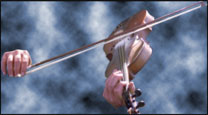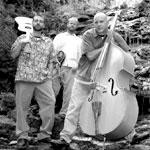
JigTime International

Slipstream - Waterbound - Review by Joe Ross, Roseburg, Oregon - email rossjoe@hotmail.com
 Slipstream,
based in Boulder, CO., is a trio that takes an innovative,
forward-thinking approach to their bluegrass and acoustic music. The
group
is Rich Zimmerman (mandolin, vocals), Brad Murphey (guitar), and Paul
Waitinas (upright bass). For a full bluegrass sound, one might immediately
notice that one singer and three instrumentalists might be a little lean.
Slipstream,
based in Boulder, CO., is a trio that takes an innovative,
forward-thinking approach to their bluegrass and acoustic music. The
group
is Rich Zimmerman (mandolin, vocals), Brad Murphey (guitar), and Paul
Waitinas (upright bass). For a full bluegrass sound, one might immediately
notice that one singer and three instrumentalists might be a little lean.
However, Slipstream wisely calls upon some good friends to assist them
as
guest artists on their debut album, including Noam Pikleny (banjo), Rushad
Eggleston (cello), Jeremy Garrett (fiddle, tenor vocals), Erin Coats
(tenor
vocals), and Ben Winship (bouzouki, mandola, tenor vocals). Their
progressive bluegrass set revolves around six numbers sung solo, four
songs
with two-part harmony on choruses (Rove Riley Rove, Slow Train Through
Georgia, Tomorrow’s Blues, Waterbound), and two snappy instrumentals
(Amesbury, Right Down There). Zimmerman sings with considerable emotional
electricity, and he seems most engaged with Brian Hansel’s Civil
War ballad, “Black Cove,” his own “Tomorrow’s
Blues,” and
bandmate Murphey’s “Right
Down There.” A John Fogerty composition, “As Long as I Can
See the Light,”
is their most up-tempo offering, and two Norman Blake songs (Slow Train
Through Georgia, Whiskey Deaf and Whiskey Blind) are tastefully rendered.
Liner notes incorrectly reference the latter as “Whiskey Death,
Whiskey
Blind.”
If anyone questions the potential use of cello in bluegrass,
they should
take a listen to Eggleston’s breaks and fills in “Whiskey
Deaf and Whiskey
Blind,” “Red Rocking Chair,” and “Monroe’s
Farewell to Long Hollow.” Liner
notes refer to Eggleston as a “groovemaster.” Slipstream
also incorporates
Winship’s mandola into the traditional “Rove Riley Rove” and “Black
Cove.”
Along with Zimmerman’s pleasant baritone vocals, this results in
Slipstream
being more “low and mournful” than “high and lonesome,” a
descriptive
moniker often more associated with traditional bluegrass music. Slipstream
still has drive in their music, but at times they cross over into new
acoustic sensibilities on some of their slower and moderate-tempo’ed
pieces.
If your definition of bluegrass requires that banjo and fiddle be present,
you might be disappointed as only one number (Amesbury) has both, four
tracks have Garrett’s fluid fiddle, and three tracks have Pikleny’s
masterful banjo.
Slipstream made its first festival performances in the
summer of 2003. They
hang with some good company and have shared jamgrass stages with quite
a few
well-known pickers. Paul Waitinas switched to upright bass only five
years
ago after hearing the Freight Hoppers’ old-timey music. Brad Murphey
(Murph)
played his guitar regularly on a television cooking show in Lawrence,
Kansas. Rich Zimmerman’s straightforward picking on his Nugget
mandolin
(built by Mike Kemnitzer) also takes a few interpretive twists along
the
way.
I’ve been very impressed with some of the acoustic music coming out of Colorado in recent times. Slipstream takes their name from that turbulence, pressure and suction found just behind a fast-moving semi-truck or airplane. I expect their first album, “Waterbound,” to also propel them to new heights and greater visibility as more and more ride along on Slipstream’s bandwagon. (Joe Ross)
 |
